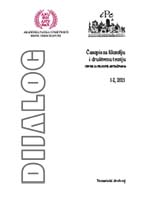Porodica protiv države: političko i politika u Hegelovoj filozofiji
Family against the state: politics and the political in Hegel’s philosophy
Author(s): Bernard Harbaš, Majda TurkićSubject(s): Gender Studies, Aesthetics, 19th Century Philosophy, Contemporary Philosophy, German Idealism, Structuralism and Post-Structuralism, Sociology of Culture
Published by: Akademija Nauka i Umjetnosti Bosne i Hercegovine
Keywords: Antigone; human law; law of God; burial; memory; Hegel; family; Derrida; law; the political;
Summary/Abstract: This article analyses Hegel’s understanding of the relation between state and individual in the Greek tragedy Antigone. Main concern of this article is the relation between two laws: human, which protects interests of a community and which is represented by Creon and law of God, which protects family and is represented by Antigone. Namely, according to the law of God, member of a family must be buried with dignity and that is, according to Hegel, one of the fundamental family duties. Sphere of human law belongs to a man who is in charge of taking care of the community’s well-being, whereas sphere of the law of God belongs to a woman who is to take care of the family. Creon forbade Polynices’ dignified burial because of which he entered the conflict with Antigone, who strived to bury her brother with dignity at any cost and to enable him thus to remain member of the polis. By questioning Creon’s decisions, Antigone disrupted masculinized system of political governance and showed that the significance of democratic acting does not only lay in the governance of the majority, but also in conflict and resistance. By confirming Polynices’ position and resisting valid laws of the polis, through her decisions she demonstrated to be equal member of the polis.
Journal: Dijalog - Časopis za filozofiju i društvenu teoriju
- Issue Year: 2021
- Issue No: 01+02
- Page Range: 168-178
- Page Count: 11
- Language: Bosnian

